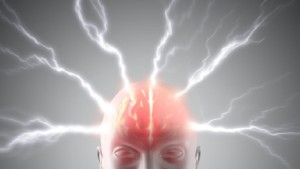Could A Buzz To The Brain Destroy Your Depression?
 Researchers from Brazil have discovered a shocking new way to target depression; through a technique known as transcranial direct current stimulation, or tDCS. In the study, which was released in the Journal of the American Medical Association, patients with depression were zapped in the head, and showed dramatic signs of improvement.
Researchers from Brazil have discovered a shocking new way to target depression; through a technique known as transcranial direct current stimulation, or tDCS. In the study, which was released in the Journal of the American Medical Association, patients with depression were zapped in the head, and showed dramatic signs of improvement.
For the study, 120 patients with moderate to severe depression were divided into four groups. Group one received the scalp-shocking treatments along with the depression drug sertraline, whilst group two received tDCS and a fake version of the drug. Group three received the depression drug but a fake placebo version of the head-zapping technique, and group four received a placebo of both the technique and the drug. The result was that the first group had a greater and more rapid improvement in their depression compared to the other groups.
So what is this technique exactly? Two pads containing electrodes are soaked in salt water and placed onto your scalp, delivering a low, constant electrical current to change the way that neurons in your brain send signals, either by activating or suppressing them. This is done for 20 to 30 minutes, and the electrodes are positioned depending on the area of your brain that is being targeted.
It may sound like a scene from the Green Mile or One Flew over the Cuckoo’s Nest, but this approach has been used for many wellness reasons. The military have used tDCS to improve the training efficiency of snipers and drone pilots, and it is viewed by the medical community as a potential treatment for a variety of other neuropsychiatric disorders like stroke, Parkinson’s disease, seizure disorders and schizophrenia.
Dr. Joshua Berman, director of the Programme in Brain Stimulation at Columbia Psychiatry and researcher of tDCS for treatment of hallucinations and chronic pain, explains, ‘When you give a medication, it goes everywhere in brain, but with techniques like tDCS, you can identify neuronal circuits that aren’t functioning the way you want. You can vary this technique to target different circuits in the brain, depending on the illness.’
According to Dr. Pascual-Leone, director of the Berenson-Allen Center for Noninvasive Brain Stimulation and professor of Neurology at Harvard Medical School, who had previously worked with one of the researchers on the current study, ‘This is the type of study that shows there may be something clinically meaningful in this treatment,’ and this technique could be a more favourable, better-tolerated treatment of depression than drugs or electroconvulsive therapy.


Comments are closed.